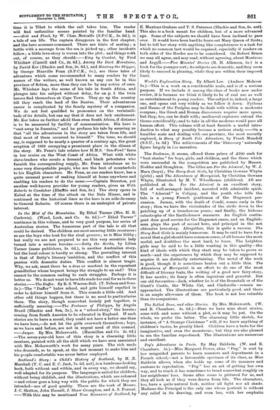In the Mist of the Mountains. By Ethel Turner (Mrs.
H. R. Curlewis). (Ward, Lock, and Co. 3s. 6d.)—" Ethel Turner" continues in this volume, and to very good purpose, her series of Australian stories. The humorous part of the tale is all that could be desired. The children are most amusing little creatures ; so are the boys who tout for the rival grocers ; so is Miss Bibby ; but really we are not prepared to see this very eccentric lady turned into a serious heroine.—Betty the Scribe, by Lilian Turner (same publishers, 3s. 6d.), is another Australian story, but the local colour is hardly so strong. The prevailing interest is that of Betty's literary 'ambition, and the conflict of this passion with domestic duties. This conflict is almost tragic. Why, we ask, must there be a deus ex maehina in the repentant grandfather whose bequest brings the struggle to an end ? This cannot be the common ending to such struggles. Perhaps it is better so. We do not want to have life made too real for us in these stories.—The Duffer. By R. S. Warren-Bell. (T. Nelson and Sons. 55.)—The "Duffer" hates school, and gets himself expelled in order to deliver himself from it. This sounds a little odd. And other odd things happen, but there is no need to particularise them. The story, though somewhat loosely put together, is sufficiently amusing.—The Fortunes of Philippa, by Angela Brazil (Blackie and Son, 2s.), is a "school-story," the heroina coming from South America to be educated in England. If such stories are to have a moral, they could not have a better one than we have here,—do not let the girls overwork themselves; boys, as we have said before, are not in urgent need of this counsel. —Jasper. By Mrs. Molesworth. (Macmillan and Co. 25. 6d.) —The seven-year-old hero of this story is a charming little creature, painted with all the skill which we have seen associated with Mrs. Molesworth's work for many years. The rich uncle who descends, so to speak, at the last moment to make him and his psople comfortable was never better employed.






























































 Previous page
Previous page